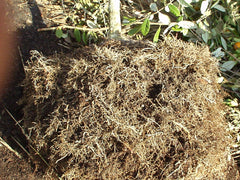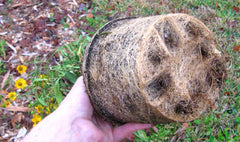
Is your container contaminating your crop? The hidden risk of plastic containers.
As a long time organic grower, I've always been very careful about what products end up in my garden. If I'm growing an edible crop, I want to keep it as clean and free of chemicals and contaminants as possible. Until recently, the idea that my container could possibly be contaminating my plants by leaching dangerous metals or chemicals was not something I even considered as a possibility.
Personally, I've chosen to use fabric pots for most of my container growing needs. As you may already know, fabric pots offer a myriad of benefits to container growers.

Fabric pots offer the distinct advantage of "air pruning" over traditional plastic containers. Air pruning is where the roots of the plant contact the fabric edge and then are naturally "pruned" when they contact the air and stop growing. This allows for greater root growth in other areas of the container and avoids the dreaded "root bound" scenario that is common in traditional containers.

When I first got into this industry, the only manufacturer I was aware of was based in the United States. However, like any industry, soon competitors were offering comparable products and cheaper pricing out of China. Since I first started using fabric pots in my garden 12 years ago, I've used many brands such as Geo Pots, Gro Pro, and many others. I assumed the only real variables were thickness of the pots, durability, and price.
In the past year, I've gotten my hands on some testing for a few different brands of fabric pots and the results were shocking. Testing showed inconsistency between batches on fabric pots across the same manufacturer. One test showed lead as high as 327 mg/kg and BPA as high as 20 mg/kg.
These tests only looked for lead content of non-metallic substrates and total bisphenol-A (BPA). Other potential toxins are heavy metals, phthalates, and BPS.
This is a huge issue and one that needs to be addressed by consumers, regulatory agencies, and most importantly by manufacturers. I would like to see increased testing of all containers by manufacturers as assurance that they are providing a clean product to growers. As the average gardener can't afford the hundreds of dollars required to test their fabric pots, I believe that organizations that certify farms and facilities like the ODA and WSDA need to recognize this as a potential source of contamination and offer some level of protection to consumers.
While the testing I've seen is related to fabric containers, I believe we should also be looking at traditional plastic pots and, more importantly, plastic saucers. Depending on environmental conditions, standing water touches the plastic in temperatures often exceeding 80F. This seems like perfect conditions for the uptake of BPA into the water which could then be taken up by the plant.
Let's bring this issue to the forefront and get a greater body of testing so growers can know that their containers are safe to use on edible crops.
One possible solution is to move to more bio-degradable and environmentally friendly containers like the Fertilpots.
Resources:
Effects of bisphenol A on growth, photosynthesis and chlorophyll fluorescence in above-ground organs of soybean seedlings.
https://www.ncbi.nlm.nih.gov/pubmed/23123119
Effects of bisphenol A on growth and nitrogen nutrition of roots of soybean seedlings.
https://www.ncbi.nlm.nih.gov/pubmed/23109293
http://newsroom.ucla.edu/releases/plastic-manufacturing-chemical-bps-harms-egg-cells-study-suggests
http://www.rodalesorganiclife.com/garden/are-your-plant-containers-leaching-toxins-your-food
http://thesoftlanding.com/are-you-ruining-your-organic-garden-with-toxic-plastic/
http://homeguides.sfgate.com/safe-grow-vegetables-rubbermaid-storage-containers-92643.html
http://www.extension.umn.edu/garden/yard-garden/soils/lead-in-home-garden/
photo credits: http://www.pennlive.com/gardening/2015/11/test_time_in_the_garden_mulch.html
http://www.victoryhydro.com/blog/2014/2/9/ubqp4bibpk8kvleiam7ipygnq4sl81
http://floridata.com/tracks/ginny/potbound.html




